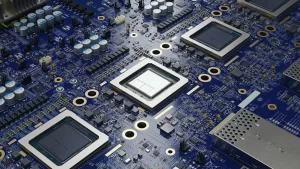LONDON — Quantum Motion, a fast-growing UK-based quantum computing company formed by researchers from University College London and Oxford University, has made a breakthrough in scalable quantum computing. The company has successfully demonstrated the swift, large-scale characterisation of quantum devices created using commercial semiconductor processes. In a remarkable achievement, Quantum Motion’s silicon chip, which integrates 1024 quantum dots in less than 0.1mm², was validated in under 5 minutes—an impressive 100 times faster than the current industry standard. The chips were fabricated by GlobalFoundries, a leading semiconductor manufacturer, which has now partnered with Quantum Motion to advance quantum processors based on a scalable silicon platform.
This landmark achievement, described in a peer-reviewed paper in Nature Electronics, underscores the potential of leveraging existing semiconductor manufacturing platforms for silicon quantum processors. Quantum Motion’s chip, named Bloomsbury, was fabricated using GlobalFoundries’ 300mm 22FDX® platform, which offers exceptional capabilities, including power-efficient edge processing, an extended temperature range (1K and below), and system-on-chip integration. Additionally, the back gate bias capability of FDX allows for precise cryogenic tuning and control, a significant edge over traditional silicon-based solutions for readout and control.
The collaboration between Quantum Motion and GlobalFoundries highlights the strength of combining cutting-edge quantum expertise with world-class semiconductor manufacturing capabilities. Quantum Motion operates as a fabless company, focusing on advanced quantum design, while GlobalFoundries provides the essential fabrication infrastructure to produce scalable silicon quantum processors. Together, they are set to bring Quantum Motion’s pioneering designs to life, making high-volume production of quantum chips a reality.
James Palles-Dimmock, CEO of Quantum Motion, commented on the success of the collaboration, stating, “Our work with GlobalFoundries has demonstrated that scalable manufacturing techniques can meet the stringent demands of quantum computing. This achievement shows that silicon-based quantum chips can be fabricated using established semiconductor processes, bridging the gap between quantum research and industrial-scale production.”
Ted Letavic, Senior Vice President and Corporate Fellow at GlobalFoundries, expressed his excitement over the partnership, saying, “This collaboration is a prime example of how GlobalFoundries is using our differentiated technologies, such as the 22FDX platform, to accelerate advancements in quantum computing. The results from Quantum Motion show that our process technology is robust enough to support innovative quantum structures. We’re excited to continue our partnership with Quantum Motion as we work toward the development of scalable quantum processors.”
Moving forward, Quantum Motion is focused on the critical challenge of scaling quantum computers. In much the same way that conventional CPUs manage billions of transistors with a limited number of input/output connections, future quantum computers must be able to measure large arrays of qubits with minimal input/output requirements. Bloomsbury’s success demonstrates that silicon-based quantum chips can integrate qubits and control electronics on the same chip, a key step in overcoming this challenge and bringing practical quantum processors closer to reality.
With the success of Bloomsbury and the continued partnership with GlobalFoundries, Quantum Motion plans to refine its chip designs and enhance the integration between quantum and classical systems, progressing towards the goal of scalable quantum computing.



















